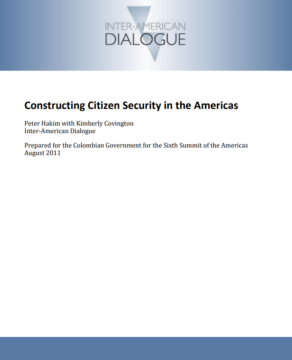Hosts: Representatives Sam Farr (D-CA), Michael McCaul (R-TX), and Dana Rohrabacher (R-CA)
Other Participating Members: Representatives Jim Gerlach (R-PA), Luis Gutiérrez (D-IL), Sheila Jackson Lee (D-TX), Mike Kelly (R-PA), and Silvestre Reyes (D-TX)
In the wake of increased violence in Mexico and the landmark Central American Security Conference in Guatemala, members of Congress met with policy experts and government officials to discuss violence and crime in the region—an issue that has become an “existential crucible” for Mexico and Central America, in the words of one participant.
Representatives Dana Rohrabacher (R-CA), Sam Farr (D-CA), and Michael McCaul (R-TX) co-hosted the dinner, which was attended by William Brownfield, assistant secretary for the Bureau of International Narcotics and Law Enforcement Affairs; Roberta Jacobson, deputy assistant secretary for Canada, Mexico, and NAFTA; Mark Feierstein, USAID assistant administrator for Latin America and the Caribbean; and ambassadors to the United States from Honduras and El Salvador. Helen Mack, president of the Mack Foundation in Guatemala, provided a perspective from the region.
It is estimated that around 40,000 have been killed as a result of Mexico’s drug war since President Felipe Calderón escalated counternarcotics efforts in 2006. Meanwhile, soaring homicide rates have made Central America one of the most dangerous regions in the world.
Participants emphasized the need to take a regional approach to security, not treat issues in isolation, and to consider long-term as well as short-term outcomes. “There are no shortcuts—we can’t spray them into prosperity,” one expert stated while discussing how to best assist the region.
The conversation quickly turned to drug policy, with one participant arguing that the US must change its mental approach to the issue.
“We need to start having an adult conversation about drugs,” he stated.
Members of Congress acknowledged the US role as the largest drug consumer, although one called the idea that legalization will solve the issue a “fallacy.” Participants noted the underlying problem of economic incentives for involvement in drug production and trafficking, highlighting the lack of opportunities for Latin American youth and arguing for a focus on economic development, not criminal justice alone.
Many viewed weak law enforcement institutions as one of the most critical issues, calling for increased training and resources for police. Some participants lauded the success of law enforcement in Colombia, and most members of Congress viewed the Andean country’s experience with violence as a positive example for Mexico and Central America to follow.
But one expert urged caution, arguing that Colombian success has occurred in “a sea of failures” and that the United States currently lacks the financial resources to repeat the Colombian model.
The United States has supported the Mexican government’s security efforts through the Mérida Initiative, and secretary of state Hillary Clinton recently pledged almost $300 million in security assistance to Central America for 2011. Some noted that Central American countries must also consider what actions they can take on their own.
“Political will is the key,” one participant argued. “If you don’t have money but you have political will, you can do things.”
Overall, the tone of the discussion was one of concern for the region.
“God made us neighbors,” one member of Congress stated. “We can no longer ignore what’s going on.”





















